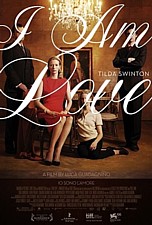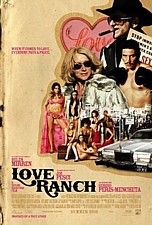
Helen Mirren shines amidst familiar surroundings, Tilda Swinton glows in an instant classic
film from a queer perspective
Reviews
| KATM media outlets |
| KATM featured weekly |
| Join Us! |
| KATM on RT |
| Vidcast Starring KATM |
| NOTE: THIS SITE ONLY LOADS CORRECTLY WITH EXPLORER AND MOZILLA BROWSERS - SORRY SAFARI USERS! |
| Buy the KATM Book |
That Old Clamoring Demon:
Love Ranch-I Am Love
Expanded Edition of 6-23-10 and 6-30-10 WCT Knight at the Movies columns
By Richard Knight, Jr.
Love Ranch-I Am Love
Expanded Edition of 6-23-10 and 6-30-10 WCT Knight at the Movies columns
By Richard Knight, Jr.
| “My God, that Helen Mirren is one sexy dame” I thought to myself after getting my first good look at Britain’s 64 year-old queen of the cinema in Love Ranch, her new film. Considering that the movie is set in 1976 with Mirren saddled in a batch of tarty clothes of processed fabrics, the unflattering beehive wigs of the period, and a cane to boot, that’s really saying something. The picture itself, based on the true story of Grace and Charlie Bontempo (with their names changed), the couple that opened Nevada’s first legal brothel in Reno, works familiar territory and is only fitfully entertaining. But it is helped enormously by Mirren’s presence. Mirren has made good on a lot of really offbeat casting choices as her male costar in her day (Mirren and Cuba Gooding, Jr. in Shadowboxer, for example) and in Love Ranch she has her work cut out for her with Joe Pesci as Charlie her husband and newcomer Sergio Peris-Mencheta (a beefier Raul Julia look-alike) as Armando, a hulking boxer she takes as a lover after Charlie insists that she become his manager. That she doesn’t quite succeed has more to do with the script by Mark Jacobson which skimps on character depth in favor of situations and the movie’s all too familiar settings. As the film begins Grace and Charlie have made their brothel, thanks to pay offs by Charlie, two sets of books and Grace’s tough management style, a shaky success (the IRS and other problems are always at hand though). It’s clear that the place, which is literally surrounded by an electrified fence and sports a guard tower to protect the flesh peddlers from the conservative protestors and other miscreants outside, has become a literal prison for Grace and that her marriage to the pugnacious Charlie is one of convenience. The arrival of Armando into the mix, whose contract Charlie has purchased, awakens Grace to the possibility of another life – especially when the gentle giant with the goofy grin takes her to bed. But Grace hasn’t counted on Charlie’s unfettered jealousy and a love triangle takes up the last third of the movie. The prizefighter and the lady stuff is highly reminiscent of many other not very good movies (like the icky Barbra Streisand-Ryan O’Neal “comedy” The Main Event) and there’s not much real chemistry between Mirren and Peris-Mencheta either (he’s one unsexy lunk). One longs for a scene with the tender sexiness Mirren and costar Christopher Plummer shared in last year’s The Last Station (just out on DVD). Part of the problem is that neither Pesci, who returns to the screen after a retirement of 11 years, or Peris-Mencheta, has nearly Mirren’s effortless ability to draw the camera to her. Pesci yells “f**k” about 500 times and plays a milder variation on one of his Scorcese Mob roles without a hint of freshness while Peris-Mencheta is simply way out of his league. On the other hand, by merely shrugging her shoulders or using the aforesaid cane to break up a catfight between two of her girls, Mirren commands the screen with seemingly the simplest effort. None of the three leads, however, plays a character we really care much about. The movie, produced and directed by Mirren’s real life husband Taylor Hackford, has great elements, a great set up, and a great cast (gay audience faves Gina Gershon and Leslie Jordan are glimpsed in passing) but doesn’t seem to know what to do with any of them. It never really catches hold and the bulk of the fault, again, goes back to the thin on character screenplay by Jacobson which piles on the subplots until they’re nearly as high as Mirren’s wigs. A movie like Love Ranch is also at least a decade past its freshness date. You’re cued to find the avaricious characters and their sordid milieu shocking and outrageous but dozens of movies (Hustle & Flow and Boogie Nights being prime examples), documentaries, and shock talk television on the same subject have made this stuff familiar to the point of blandness. But then again, every time The Mirren walks into view… +++++++++++++++++++++++++++++++++++++++++++++++++++++++++++++++++++++++ Where to begin with the sumptuous feast that is I Am Love, the latest collaboration between queer audience favorite Tilda Swinton and Italian writer-director Luca Guadagnino? You will pardon all the forthcoming metaphors but when confronted with the rare film that successfully combines so many ingredients that appeal to all the senses in the process – not to mention one whose central premise hinges on the leading character being dumbstruck by love after eating a dish of prawns – the result is a cinematic repast so delicious that one can only stand back in awe at its sheer artistry and hail it as a masterpiece. Swinton plays Emma Recchi, a Russian émigré who long ago married into a wealthy Italian industrial family based in Milan and mother of three adult children. But the family is in the midst of change. At the outset of the film, during a lavish birthday party sequence in his honor the elderly grandfather, head of the family business, names both Emma’s stern husband Tancredi (Pippo Delbono) and her youngest son, the artistically inclined Edoardo (Flavio Parenti) as his successors. As the party is concluding Edo briefly introduces his mother to his new friend, a chef named Antonio (Edoardo Gabbriellini) with whom he wants to start a restaurant. Months later, Emma accidentally discovers a note from her daughter Elisabetta (Alba Rohrwacher) to Edo in which she confesses she’s fallen in love with a woman. Eventually, this emboldens Emma to embark on her own personal journey back to love – sparked by an unexpected (and sensually recorded) love affair with the decidedly hunky, enigmatic Antonio. But soon tragedy interrupts the lives of all the characters in Guadagnino’s operatic-like scenario which builds to an intensely dramatic ending that features a magnificent requiem to love presented over the end credits. Swinton, in her stylish, color coded, couture wardrobe (you will never forget her orange dress and later, orange pants), is a marvel playing her entire role in Russian accented Italian (take that Meryl). The sweeping visuals and melodrama on screen (conveyed with character details rather than talky talky dialogue) are perfectly complimented by the director’s judicious use of selections by John Adams, the dean of modern composers – especially in a pseudo chase/stalking scene between Emma and Antonio in which she wears the Kim Novak Vertigo knot in her hair. There are nods to dozens of other films and filmmakers but the familial passions and sweeping visual palette of Visconti, the outsized emotions trapped beneath the luxurious lifestyles by the characters of Sirk and the hyper, artificial stylization, control and sexual gender bending of Hitchcock are the most prominent. Guadagnino acknowledges these classic masters of cinema and in the process creates one of his own. My only regret about I Am Love was seeing it come to an end. Especially in light of the news that director Guadagnino once contemplated releasing a 3 ½ hour cut of his astounding film (“astounding” is the proper adjective to describe it, I think). But even at two hours this is a gorgeous, sensual, epic- sized exercise in cinema sophistication that heralds the arrival of a major talent in Guadagnino and another notch in the heady resume of Swinton. When I Am Love finishes its theatrical run they should commit this fabulous movie to canvas and exhibit it in an art museum. |





